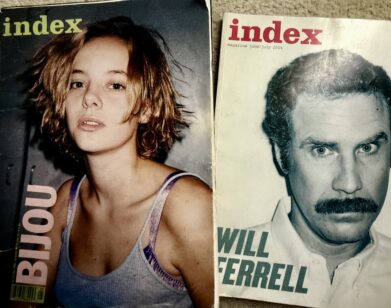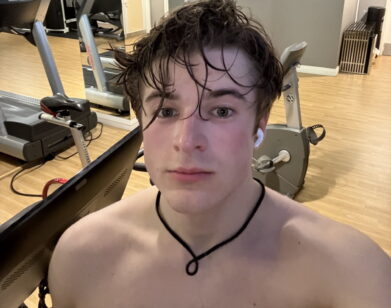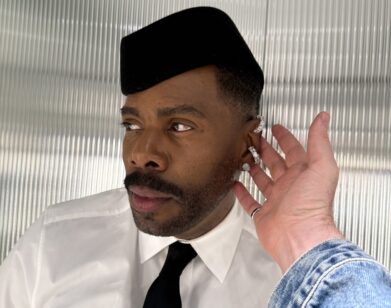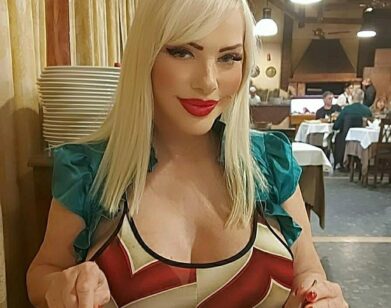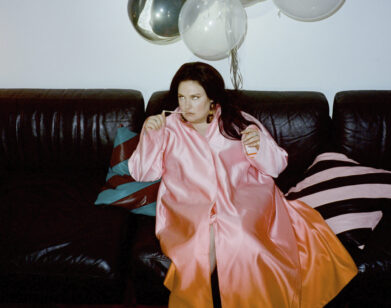EDITOR
New York’s David Haskell Tells Mel Ottenberg Why He Still Believes in the Power of Magazines

New York magazine’s editor-in-chief David Haskell takes a lunch break to talk publishing, politics, and TikTok lines with Interview’s own Mel Ottenberg.
———
THURSDAY 11 AM OCT. 24, 2024 NYC
MEL OTTENBERG: I brought you a magazine.
DAVID HASKELL: Oh, great. I do subscribe, but they haven’t arrived yet.
OTTENBERG: Do you want Liza or Alex Consani?
HASKELL: I’ll go Liza.
OTTENBERG: That’s what I figured.
HASKELL: And I’m also going to try to have a Shawn Mendes cover, because I have a thing with friends who think I look like him.
OTTENBERG: Oh, really?
HASKELL: Yeah. Can I get an Americano, please? With some regular milk on the side.
SPEAKER 1: Okay.
HASKELL: Thank you. Before we start, can you tell me what you think makes a good Interview magazine interview?
OTTENBERG: What makes a good Interview magazine interview is an actual conversation where you get a vibe about who this person is, a living, breathing moment between people. There’s something revealing, but it also just feels like a time capsule of the moment, without trying too hard.
HASKELL: How often do you do the interview?
OTTENBERG: I don’t know. I just like doing the interview once in a while because I like talking to people. What about you? What’s your process?
HASKELL: I mean, the kind of dangerous, live-wire aspect of how you do it is part of what makes the magazine feel so alive right now. And it’s so different from how I do it as editor-in-chief. I’m rarely writing with a byline, and I don’t do that many interviews. I like shaping material. It’s more exciting to me. I basically feel like my role is a director of a movie. You’re casting, and you’re working towards a big picture, but then you’re also in the editors room shaping the material. You’re putting on a show, and all that stuff feels easier for me than to sit down and interview somebody in front of a live audience, or have that kind of social media presence where you’re always on.
OTTENBERG: I like reading your movie cover to cover, in print.
HASKELL: I love my job and I think it shows up in the magazine. Whenever we see each other and we’re trading war stories and compliments, I think it’s because we’re both having fun and editing from a place of confidence. That confidence allows you to be ballsy; it allows you to be creative and switch things up. I’m often pushing the staff towards a weirder direction.
SPEAKER 1: Can I take your order?
OTTENBERG: We didn’t look at the menu yet. Do you know what you want?
HASKELL: I’m interested in that egg and artichoke thing.
OTTENBERG: It’s good.
HASKELL: I’ve worked at New York magazine for 16 years now, and for 10 of those, I was an editor working for the boss. But yeah, giving people permission to follow their gut and not censor their own brains—we hire interesting weirdos, for the most part. There’s something unusual about everybody that we employ, but the tendency when you work at a larger organization is to try to flatten yourself out to figure out how to succeed.
OTTENBERG: One hundred percent. Wait, but did your training for the first 10 years give you the full idea of what the magazine is supposed to be in an ever-changing world?
HASKELL: Yeah. My predecessor was a fantastic editor and saw it through a big transition from a print magazine to a magazine that was both print and digital. It was a sort of restoration project to make New York magazine as great as it was in its first decade. By around 2003, it was kind of a shell of itself. And so one of the things we did was create all these verticals like Vulture, The Cut, and Curbed, as places to double down on all of our obsessive enthusiasm around different subjects.
OTTENBERG: Right.
HASKELL: And then the big irony—my phone, literally right before I got here, popped up this article from Bloomberg about the great print revival of 2024. That’s what I’ve been saying to my colleagues and bosses for the last year or so, which is that the print magazine is an incredibly thrilling, contemporary product, and the world is catching up to why it’s a smart business move. We publish a magazine every two weeks, publish about 80 stories a day on the website, and publish six episodes of a podcast each week. There’s so much different stuff coming out in the cinematic universe of New York magazine, and I think it all creates an environment you want to be in if you’re a certain kind of person. We’re not for everybody, and that’s really important to own and be confident about, but there’s a handful of a million people who are oriented around that same sensibility—a New Yorker’s sensibility.
OTTENBERG: How does the print issue come together? How many issues are you doing a year?
HASKELL: We do 26 issues a year and plot far in advance. I already know what the theme of the anniversary issue for next spring will be.
OTTENBERG: Excuse me. He’s going to have the egg thing. I’m going to have the svizzerina and we’ll share an insalata verde. And may I have an iced tea?
SPEAKER 1: Sure. And would you like another coffee?
HASKELL: Yes, thank you. So it’s fun because we can have some things that take six months to make, and then we’re nimble enough to make a news cover. Even though it also adds a ton of anxiety and stress, it’s thrilling to tear things up. There was a time in May when it was clear that campus protests around Israel and Gaza were the biggest story in the world. We had all been reading a ton of reported pieces from professional journalists about the issues, and it was all starting to feel a little bit exhausting. So that Monday, week one, we had a big brainstorm of some out-of-the-box ways of covering the story. And somebody was like, “Why don’t we just invite the Columbia Daily Spectator, the student newspaper, to take over the magazine?” And then that’s literally what we did. The staff of the Spectator were fantastic, eager, trust-worthy, and game to work with us. What we published ended up being 100 percent reported by them, conceived and edited by us in collaboration with them, and the quick turnaround of it was so invigorating.
OTTENBERG: You’ve told me how you’ve had something planned, and then last minute, the cover story completely changes when something happens.
HASKELL: Well, we just lived through the most extraordinary political moment in my lifetime, going from Biden to Harris, and I realized that nobody would be able to move as quickly as us. There was no way that Kamala Harris would have a September Vogue cover, because that shoot had already happened. It used to be that Time and Newsweek would come out on Monday, and they would sort of own the week, but they don’t really matter culturally the way they used to. And so, it was really exciting to be able to be the first ones to have a cover that expressed the emotional tenor of the moment.
OTTENBERG: Okay, so it’s September and we’re at Milan Fashion Week, and it turns out that your Washington correspondent Olivia Nuzzi is having an affair of the text or the body, I have no idea, with RFK Jr. What do you do? Great writer by the way.
HASKELL: That has been the hardest thing for me in my job. Olivia’s radically talented. She has published amazing journalism. When I would see you every day in Milan and for most of that week, the story hadn’t yet broken, and navigating that was so stressful. The main thing I would say is that secrets are the hardest thing for humans to deal with, and journalists traffic in secrets. Your job is to reveal them and it’s also to hold them. I just came out of this with a much clearer appreciation for all the systems and culture and codes of conduct for a newsroom to help a reporter navigate through all that. Once I knew that she had had that relationship, it was clear that we would have to disclose it to our readers, and how we did that was an incredibly difficult process to get through. But I knew where we had to land.
OTTENBERG: That’s why we’re here doing this interview—because I took a video of you at the Ferragamo show the day the story broke and I thought you looked really great. Grace under pressure. How are you handling post-election coverage?
HASKELL: I think every news organization is trying their best to figure out how to prepare for a second Trump term. But that’s a really hard thing to figure out and a lot of it has to do with just steeling yourself emotionally as opposed to actually plotting what specific stories you’re going to want to assign. One of the things that I think about a lot is reader appetite and reader exhaustion. We’re not The New York Times. We don’t have to cover everything. We have to do what we want and be sensitive to what readers are interested in reading. You have to be in tune with their appetites. I don’t know how many people are actually reading all these articles about the terror of a second Trump term that some of our competitors are doing. I think that it’s hard to process emotionally.
OTTENBERG: In a way, Donald Trump winning a second term could be good for a magazine like New York.
HASKELL: I just think that we will respond well. And it’s not just him. It’s all the billionaires who are hitching themselves to Trump, they don’t believe anything he’s said. They’re making a bet and following the money. There’s so many interesting stories in there, and they’re not just conceptually interesting, they’re meaningful. What is the story behind the story here? What is Bill Ackman doing? What is Elon Musk doing? It’s going to be really rich material for journalists to unpack and uncover.
OTTENBERG: Alright, we have to get off of Trump. I could sit here and talk to you about this for thousands of years but my editors will be like, “What the fuck?” I’m looking at my questions. How do you define success?
HASKELL: When people from all walks of life reach out to say that an article hit them somehow, when you’ve broken through the constant churn and scroll to do something that grabs people’s attention. It’s nice when they like it; it’s also exciting when they don’t or when it sparks a whole series of secondary conversations. You see it in overall traffic numbers. But personally, I know something’s landed when my stepmother, my brother who’s 17 years younger than me, and random people on social media start reaching out.
OTTENBERG: What about fashion? You’ve suddenly become a fixture at the European fashion weeks.
HASKELL: In my own way. I’d never been before and I decided around this time last year to go to Paris in the spring and Milan in the fall, and learn as quickly as possible a ton more about how the business and the industry and the culture actually work. We’ll see how much of it I do going forward. Imagine arriving at Paris Fashion Week for the first time with Lindsay Peoples on your left and Cathy Horyn on your right, introducing you to how this place works? That was thrilling.
OTTENBERG: Totally.
HASKELL: Lindsay and Cathy, in their different ways, command such respect and I’m so proud of them as colleagues. I’ve occasionally gone to shows in New York, but this is my first time in the muck of European fashion. What I’ve realized is these are creative brands in a commercial industry, and that’s true of Hollywood, and true of us and our jobs in magazines. It’s dramatized in these highly theatrical shows, and the big suspense is, can they pull it off? Can they sell it? And does it express the brand that they are interpreting in a way that pushes that identity into a new direction, but doesn’t push it so far that it creates some sort of chaos? Once I realized how similar the fashion world is to Hollywood, it became really exciting for me to watch. It’s like, okay, this is a summer blockbuster, this is an awards contender, this is an indie darling. This person is the director who’s been doing this for decades and decades—do they still have it?
OTTENBERG: I’ve noticed you taking it all in, like a Robert Altman character in Prêt-à-Porter. [Laughs] You’re thinking about things in a different way. That’s a compliment.
HASKELL: [Laughs] I feel like the luckiest guy at fashion week. The Cut is a fashion title and it’s a part of the New York magazine world and we cover fashion in a really interesting way, but we’re able to engage with it on our own terms more than some traditional fashion titles are able to do, and that’s a privilege. We’re allowed to explore business stories, culture stories. We just have a lot more journalistic freedom by being both of the world and not.
OTTENBERG: Totally. Your side hustles are a distillery and pottery, right? What’s the deal with the distillery?
HASKELL: The distillery I cofounded with my friend from college, Colin Spoelman. We own it together, but he runs it. It has a campus in the Brooklyn Navy Yard in different buildings. All the whiskey we sell, we make ourselves in those buildings.
OTTENBERG: How do you drink whiskey?
HASKELL: On the rocks.
OTTENBERG: Do you have a whiskey every day?
HASKELL: No.
OTTENBERG: Do you have a drink after work?
HASKELL: Often.
OTTENBERG: You seem like you have a good handle on your personal life and professional life. Is that real or are you just working 24 hours a day?
HASKELL: No, I mean, the thing that’s in my life more than the distillery on a day-to-day is the ceramics.
OTTENBERG: You need to up your Instagram because I looked at it and you haven’t posted in like 14 months.
HASKELL: I know. I’m totally conflicted about how to deal with Instagram. But I go every Tuesday night and then one afternoon on the weekends to the studio that I share in Brooklyn. The Tuesday night routine is great because I’m by myself. If I’m throwing a piece on the wheel, my hands are full of clay and it takes being on the phone off the table.
OTTENBERG: I’m thinking about your most recent cover story, “Media Elites Tell All.” There were a few people, myself included, who were saying that we’re on the cusp of a totally new thing in the media. What do you think that is?
HASKELL: So we just published this massive project talking to all of these powerful people in the media about how the business is actually doing. The biggest takeaway is that everyone’s despairing and it’s so hard. Honestly though, my biggest feeling is one of optimism. It’s like the music business post-Napster collapse, recognizing that, wait, there can be another way to pay artists who make great work. New York magazine’s business is probably more durable than it’s been in its entire 56-year history. And that’s because we have a subscription business that’s working and growing. Obviously not every magazine out there can command a price, but we can. And so personally, I feel very aggressive; I just want to grow a lot. But then beyond New York magazine, I think that if you’re really good at making something that people like, there’s a bright future. But it sucks if you’re not or if your brand is struggling to find it’s relevance—that’s a perilous place to be.
OTTENBERG: It’s like people saying that New York nightlife is dead. It’s like, “No, it’s just changed and it’s moved away from you.” If you’re cool and know what’s going on, the city is reinvented for you. I think it’s the same with the media shift.
HASKELL: Yeah. You don’t need a print magazine to get information. But my big bet, the fundamental conviction around New York magazine, is that what a magazine gives you, whether it’s print or digital, can be exactly what everybody wants. A magazine’s sensibility, its attitude, its commitment to actually entertaining you, is not an extinct concept.
OTTENBERG: Exactly. Things need to be editorialized.
HASKELL: I’m so pleased and grateful that New York magazine is owned by the people who own it. The infrastructure and support that you either have or don’t have is that invisible set of circumstances that will set an institution up for success or failure.
OTTENBERG: True. Wait, real talk. Was editor-in-chief of New York your dream job?
HASKELL: No, I’d never—
OTTENBERG: What was your first title at New York magazine 16 years ago?
HASKELL: Deputy culture editor.
OTTENBERG: And then?
HASKELL: Features editor.
OTTENBERG: And then?
HASKELL: Deputy editor. And then a strange title that I invented, so it wasn’t anyone’s fault but mine.
OTTENBERG: Tell me what it was.
HASKELL: It was editor for business and strategy. There was a time when New York magazine’s CEO, Pam Wasserstein, wanted to do a lot more with the brand than had been done previously. She was interested in books and TV and film and events and spinning off other things, the most productive of which was launching The Strategist as a digital site, not just a section of the print magazine. And so I was helping her with a lot of those projects, and we formalized it so that I spent half my time working on features editing and then half my time working with Pam on expressing the magazine’s editorial in different areas. And that was the position I was in before Adam [Moss, New York magazine’s former EIC] left.
OTTENBERG: You weren’t gunning—
HASKELL: I wasn’t, because Adam, my predecessor, was able to build the magazine from something that had been sort of written off as past its prime into a thriving publication. And so I just thought to myself, “Why would I ever want to inherit that? That sounds like a fun thing to do elsewhere.” But I’d never really been interested in going anywhere else. It was only coincidentally around that time that I’d started wondering whether that was a mistake and if I should start putting myself out there and thinking about other jobs. There was no indication that Adam was going to leave, and again, I couldn’t imagine wanting to take it over. And so I created a website for myself the day before, and out of the blue, Pam told me that Adam was stepping aside and that she wanted me to run the magazine. So that was a crazy twist.
OTTENBERG: When Pam told you that, could you see it right away?
HASKELL: Yeah. I knew that if I could get past the fear of, “Can I step into his shoes?” that I would probably have a blast. I took over in April 2019. The magazine merged with Vox Media by the fall and then we were in the pandemic by the next spring. So much changed so much faster than I thought it would. It became mine, and I was less self-conscious about editing Adam’s magazine.
OTTENBERG: A lot of cover stories from the Adam Moss era really got me. Shoutout to “A Serial Killer in Common,” which was the Long Island Serial Killer cover. It was an amazing article.
HASKELL: Yeah. Some of the best material that New York magazine has published in its history has had an element of gossip and scandal and tawdriness. I’m always sort of reminding myself that it’s that balance of punkishness and classiness that—
OTTENBERG: Can I have a coffee, black?
SPEAKER 1: Americano?
OTTENBERG: That’s fine.
HASKELL: You want to be in that tension. The magazine needs to have a certain amount of rudeness to it.
OTTENBERG: Gossip.
HASKELL: Gossip, and an unpolishedness. It was invented in reaction to the respectability of The New Yorker, which Tom Wolfe wrote about in New York magazine’s first issues as being dreadfully boring. It was meant to be like, “Okay, you subscribe to The New Yorker because it makes you a better person, but secretly you’re bored by it. Here’s a magazine you’re actually going to want to read.” That’s in our founding DNA and I need to remember that, because you can get caught up in your own vanities. Sometimes I feel in direct competition with The New Yorker, The Atlantic, The New York Times Magazine, and that’s exhilarating to be in that ring with them. But we’re doing something else, and I remind myself of that because it gives us permission and liberty to be hitting more beats than a truly respectable magazine or an upper crust magazine would be.
OTTENBERG: Wait, okay. What are you most disgusted by in New York right now?
HASKELL: TikTok lines.
OTTENBERG: [Laughs] Like, when you want to get your cronut, but there’s a TikTok line?
HASKELL: Yeah, right. [Laughs] But the swarm and how it hits small businesses that are basically unprepared for a surge or, more cynically, designing themselves for that surge, just reminds you of the tourist aspect of the city in a way that can bum you out. I’m friends with a handful of small business owners that are on the one hand reliant on that kind of attention, but on the other hand, it just incentivizes them to be a different kind of business than they actually want to be.
OTTENBERG: Are there any questions I should have asked you?
HASKELL: I saw one that I was going to ask of you also, which is, “How do you think your queerness affects your editing of the magazine?”
OTTENBERG: Well, before I came to Interview as creative director, the magazine was seen through this straight lens. But I’ve always connected to the Interview I knew as a kid, which was Andy Warhol’s Interview via The Warhol Diaries and Ingrid Sischy’s Interview, which was so great when I was a teen. Both had a profound effect on me; both were really fucking cool.
HASKELL: Yeah.
OTTENBERG: So I think it’s cool to go through a queer lens, because it’s not for everyone. There’s so many people that are trying to be something for everyone, and I just inherently feel like that’s the wrong thing for Interview, from a business perspective.
HASKELL: Yeah.
OTTENBERG: There’s so many straight people out there. If Interview is too gay for you, go away.
HASKELL: Yeah. I’m surprised at how few gay people there are at the top of some of the big journalism institutions in the country, because for me, it’s so helpful to have always felt a sense of otherness, or an alienation from and attraction to culture. When I think of how many great magazine editors were British or Canadian or women, like Tina Brown, Caroline Miller at New York magazine—being in a non-dominant position. As a white guy, I’m very grateful that I’m gay, because it gives me a—well, yeah.
OTTENBERG: I just want to be authentically me in how I edit Interview, as opposed to, “It needs this queer lens.”
HASKELL: There’s two things that, for me, are connected to my being gay that are very useful in being the editor of New York magazine, and one is theatricality—a kind of theater-kid perspective on how you’re going to put this information out there in the world. It needs to have a kind of fabulousness, basically, to our headlines. The drama of a story is something that I think of in sort of showbiz terms. And then the other thing is an unsqueamishness—being interested in perverseness, not being afraid to access aspects of life that might be too risqué.
OTTENBERG: Well said. That reminds me—I think I told you this already, but last year I was at an intimate gathering at Derek Blasberg’s house, and right after I left, the famous mother of a famous nepo baby started screaming at Olivia [Nuzzi] and calling her a cunt over the nepo baby story. Like, “How dare you?!” I was like, “New York magazine’s so major that it can instill this anger, and I can’t believe I left and missed this moment.”
HASKELL: That made me feel great. I’m not trying to troll people. I think if something feels like a troll, then you haven’t really earned it. But there’s so much of life that is worth going there and saying things that are going to make people upset. The nepo baby project, it was meant to put a mirror to modern Hollywood and explain how it works. We did it knowing that it would anger some people. It’s not that we’re assigning every story that we know will make people upset. There’s got to be a filter; you’ve got to go, “Is this worth it?” But there’s so many things that do matter enough.
OTTENBERG: Sometimes, maybe someone too powerful gets wind of what you’re doing and tries to crush it?
HASKELL: That happens so rarely, and it’s never been successful in my world, but I think people imagine that it happens all the time.
OTTENBERG: It’s happened to me a lot recently, and it’s worked out in my favor.
HASKELL: I think we’re one of the only magazines that publishes ambitious culture profiles of big celebrities. When I say “ambitious,” I mean pieces that are deeply reported with a lot of access that are truly trying to reveal them on the page. That’s risky for a celebrity, and the economics of the celebrity business and the media business are such that celebrities have a lot of cards. Beyoncé doesn’t need a New York magazine cover, so there’s ways in which we’re unable to make something happen because we’re not going to be able to get the participation that we want. That kind of blockage happens all the time. We’ll just walk away from the possibility of covering an actor because we’re not going to get enough time for that piece to really be worth it. The thing that doesn’t happen that often is when we’re in the middle of a story and suddenly the subject of it wants it killed. I’ve had a handful of those conversations, but if we’re that far along I just—I was actually probably one of the last people to be bullied by Scott Rudin.
OTTENBERG: Okay, wow, that’s sick.
HASKELL: He was unhappy with a review of a play by our critic and therefore refused to allow her to see the next play. We bought her a ticket and sent her anyway. He called me, furious. I got through the call, took a deep breath, and moved on. There was nothing he could do, he didn’t change my mind, we had sent her anyway, we were in the right, and I could stand up to a bully in that particular circumstance.
OTTENBERG: Yeah. I’ve had them a lot recently with people threatening me, and it’s been fine. After a while, you just don’t freak out over it.
HASKELL: Yeah.
OTTENBERG: Alright, any other questions that I should ask you?
HASKELL: No.
OTTENBERG: Thank you for giving me the time.
———
Grooming: Taichi Saito using Kérastase at Art Department.
Production Assistant: Claudia Malpeli.
Bullying by Scott Rudin.


